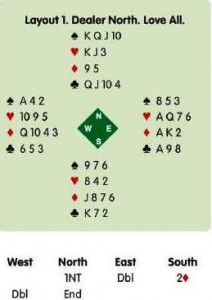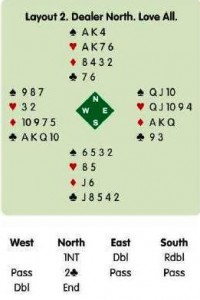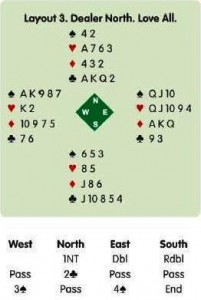Source: Mr Bridge
Most doubles of low-level suit contracts are for take-out. However, once you have used one penalty double, all further doubles should be for penalties. A common occurrence of this arises after you or your partner doubles a INT opening: if the opponents run from INT, you must not let them get away – use your doubles for penalties. A word of warning here: to double low-level suit contracts for penalties you do need length in the trump suit – high cards are not enough.
North opens INT and East doubles for penalties. South has a horrible hand and should just leave his partner in it – he
will go two or three down. This South felt the need to rescue his partner and so bid his longest suit: 2![]() . This would work against many a West because he would fail to find the correct call. From West’s point of view, his side has the majority of points, he has good diamonds and the opponents are running: double. On the
. This would work against many a West because he would fail to find the correct call. From West’s point of view, his side has the majority of points, he has good diamonds and the opponents are running: double. On the ![]() 10 lead, the most accurate defence will make nine tricks leaving declarer four off for 800.
10 lead, the most accurate defence will make nine tricks leaving declarer four off for 800.
Many players use a wriggle to escape from INT doubled: this is not always best, but it tends to work because their
opponents are not patient enough to wait and double them. Here, North opens INT and East doubles. South has a five-card suit and so plans to take-out to 2![]() , but in their system he starts with a redouble, which asks North to bid 2
, but in their system he starts with a redouble, which asks North to bid 2![]() .
.
You do not need to worry about their system, just be patient. West with a good hand considering his partner has shown 15+ should pass, happy to play in 1NT redoubled. North does as requested and bids 2![]() . This is when many an East would lose patience, bidding 2
. This is when many an East would lose patience, bidding 2![]() , but whenever you have described your hand neatly, you should trust your partner to find the right call: West knows East is strong. South passes 2
, but whenever you have described your hand neatly, you should trust your partner to find the right call: West knows East is strong. South passes 2![]() confirming that he holds five clubs and now West pounces: double. East trusts his partner and declarer scrapes together five tricks – two ace-kings and one trump – three off is worth +500, which is more than 3NT making your way (+400).
confirming that he holds five clubs and now West pounces: double. East trusts his partner and declarer scrapes together five tricks – two ace-kings and one trump – three off is worth +500, which is more than 3NT making your way (+400).
After the same start to the auction – South redoubles and North bids 2![]() as per their convention: once again, both West and East are patient hoping for a penalty. Then, when 2
as per their convention: once again, both West and East are patient hoping for a penalty. Then, when 2![]() comes round to West, he can see he needs to take some other action. He has enough strength for game (10 points and partner has 15+), but, without enough trumps, it cannot be right to defend 2
comes round to West, he can see he needs to take some other action. He has enough strength for game (10 points and partner has 15+), but, without enough trumps, it cannot be right to defend 2![]() , so he shows his own suit instead. It is important to make a jump bid to show his strength: 3
, so he shows his own suit instead. It is important to make a jump bid to show his strength: 3![]() . East then chooses 4
. East then chooses 4![]() rather than 3NT. 2
rather than 3NT. 2![]() doubled would have gone one off, but +100 is nowhere near as good as the +420 available in 4
doubled would have gone one off, but +100 is nowhere near as good as the +420 available in 4![]() .
.
Conclusion
Once you have made one penalty double, all subsequent doubles should be for penalties. Doubling is not antisocial; it is a normal part of the game of bridge. It is especially important playing duplicate pairs, when +100 can be a poor score, whilst +200 or +300 will score so much better, let alone +800 and +1100.





